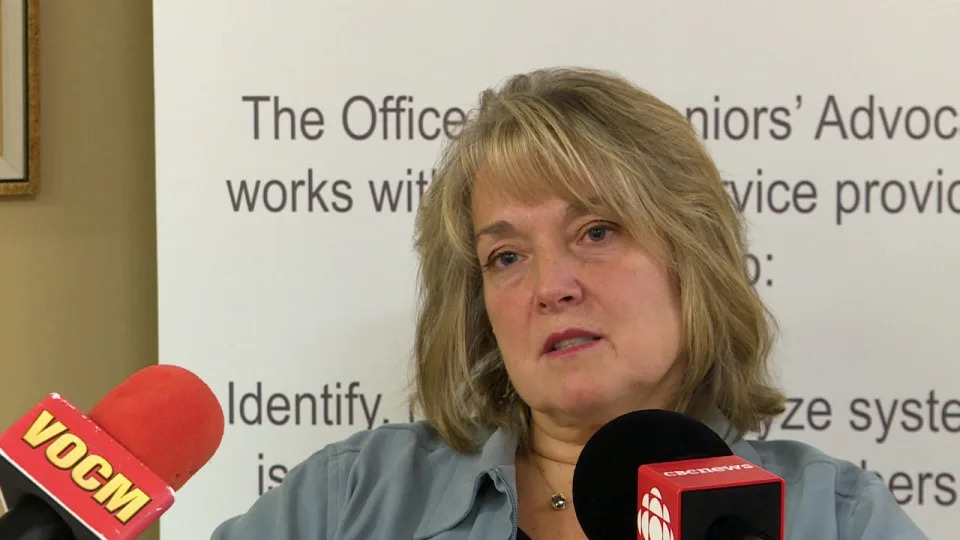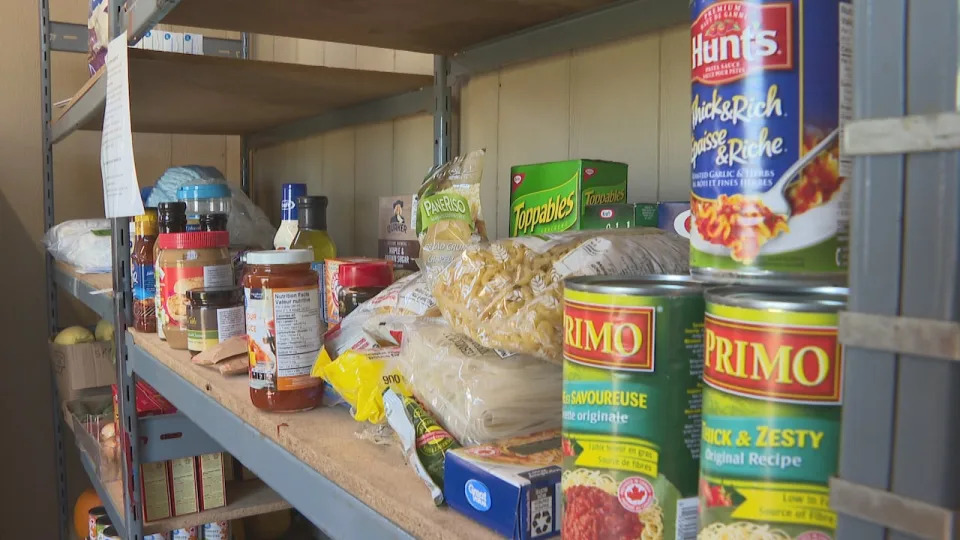CBC
Tue, November 14, 2023

Susan Walsh, seniors' advocate for Newfoundland and Labrador, has released a report that looks at problems facing seniors in the province.
(Henrike Wilhelm/CBC - image credit)
Newfoundland and Labrador's seniors' advocate has released a report that shows nearly one-third of people over 65 are struggling financially, due in part to provincial systems and benefits.
In her report, titled "What Golden Years?", Susan Walsh has come up with 12 recommendations for improving five areas — insufficient pension benefits, costs for home support services, food costs, medical care costs and costs to prevent illness.
Walsh said they heard from more than 1,000 seniors in the process of crafting the report. Of the 32 per cent who said they couldn't afford to meet their needs, 60 per cent said they go without food and 57 per cent said they cannot purchase medical supplies and devices.
"When you meet with seniors, they're very proud," Walsh said. "They work their entire lives. They raised their families. They did all the right things. And so no one wants to talk about not having the money to now live on to be poor in old age. 'How did I get here?' It keeps being the question that we hear."
Seniors in the province can avail of the old age security benefit and guaranteed income supplement, which are both federal initiatives. There is also a provincial fund called the N.L. seniors' benefit, which pays a maximum benefit of $1,516 annually to people who make less than $29,402.
That amount was increased 10 per cent in 2022, after going six years without adjustments.
Walsh's top recommendations are for the N.L. seniors' benefit to be indexed to the cost of living, and for the province to review the income threshold for someone to receive the maximum benefit.
"The goal here is to have the N.L. seniors' benefit keep pace with inflation and increase eligibility for seniors above the $29,000 cut-off," Walsh said.
Some seniors living on 'tea and toast'
Walsh said she decided on the title for the report after speaking with seniors who often asked the question, "What golden years?"
One of their biggest concerns was buying food. While many seniors can't afford food, the report said others have trouble accessing it — they can't get to the grocery store, or they struggle to carry heavy bags on their commute.
The province introduced food delivery programs during the height of the COVID-19 pandemic, but the programs faded out when emergency funding dried up.
Newfoundland and Labrador's seniors' advocate has released a report that shows nearly one-third of people over 65 are struggling financially, due in part to provincial systems and benefits.
In her report, titled "What Golden Years?", Susan Walsh has come up with 12 recommendations for improving five areas — insufficient pension benefits, costs for home support services, food costs, medical care costs and costs to prevent illness.
Walsh said they heard from more than 1,000 seniors in the process of crafting the report. Of the 32 per cent who said they couldn't afford to meet their needs, 60 per cent said they go without food and 57 per cent said they cannot purchase medical supplies and devices.
"When you meet with seniors, they're very proud," Walsh said. "They work their entire lives. They raised their families. They did all the right things. And so no one wants to talk about not having the money to now live on to be poor in old age. 'How did I get here?' It keeps being the question that we hear."
Seniors in the province can avail of the old age security benefit and guaranteed income supplement, which are both federal initiatives. There is also a provincial fund called the N.L. seniors' benefit, which pays a maximum benefit of $1,516 annually to people who make less than $29,402.
That amount was increased 10 per cent in 2022, after going six years without adjustments.
Walsh's top recommendations are for the N.L. seniors' benefit to be indexed to the cost of living, and for the province to review the income threshold for someone to receive the maximum benefit.
"The goal here is to have the N.L. seniors' benefit keep pace with inflation and increase eligibility for seniors above the $29,000 cut-off," Walsh said.
Some seniors living on 'tea and toast'
Walsh said she decided on the title for the report after speaking with seniors who often asked the question, "What golden years?"
One of their biggest concerns was buying food. While many seniors can't afford food, the report said others have trouble accessing it — they can't get to the grocery store, or they struggle to carry heavy bags on their commute.
The province introduced food delivery programs during the height of the COVID-19 pandemic, but the programs faded out when emergency funding dried up.

Food bank operators say demand for what items they do have is as high as it's ever been.
Newfoundland and Labrador has the highest rate of food bank usage in Canada, at 10.6 per cent of users, according to Food Banks Canada. (Brittany Spencer/CBC)
"We have heard from our community partners in the food charity sector that the number of seniors they serve is increasing and many are struggling, since the ability to deliver food has ended," Walsh said. "Some are living on tea and toast."
Walsh recommended the province introduce a food delivery program immediately, echoing the same calls from Food First N.L., which advocates for
The report also looks at eligibility and accessibility of home care.
Newfoundland and Labrador is one of six provinces and territories in Canada where people have to co-pay for home-care programs. Walsh looked to British Columbia, where all seniors who receive federal income assistance are guaranteed free home care. She's recommending Newfoundland and Labrador do something similar, allowing people to stay longer in their own homes.
Walsh said her office will monitor the recommendations and she hopes the province will enact them to help seniors as soon as possible.
"They're struggling and it's our responsibility to do something about that."
"We have heard from our community partners in the food charity sector that the number of seniors they serve is increasing and many are struggling, since the ability to deliver food has ended," Walsh said. "Some are living on tea and toast."
Walsh recommended the province introduce a food delivery program immediately, echoing the same calls from Food First N.L., which advocates for
The report also looks at eligibility and accessibility of home care.
Newfoundland and Labrador is one of six provinces and territories in Canada where people have to co-pay for home-care programs. Walsh looked to British Columbia, where all seniors who receive federal income assistance are guaranteed free home care. She's recommending Newfoundland and Labrador do something similar, allowing people to stay longer in their own homes.
Walsh said her office will monitor the recommendations and she hopes the province will enact them to help seniors as soon as possible.
"They're struggling and it's our responsibility to do something about that."
No comments:
Post a Comment